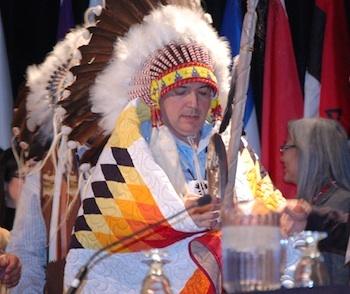Image Caption
Summary
By Shari Narine
Windspeaker Contributor
OTTAWA
First Nations chiefs are giving a conditional nod to the second budget brought down by the federal Trudeau government.
The 2017 budget allots $3.4 billion over five years – on top of the $8.4 billion committed in the 2016 budget also for a five-year period– for Indigenous peoples in such areas as increased post-secondary education and training; supporting women; the criminal justice system; health care; involvement in climate change initiatives; and community infrastructure, such as water treatment systems, health facilities, schools and child care centres.
However, funding for some initiatives, such as on and off reserve housing, and policing does not kick in until 2018-2019.
Finance Minister Bill Morneau said his government will have increased funding “well in excess” of the two per cent cap, with 27 per cent in funding for Indigenous peoples between the time the Trudeau government came to power in 2015 and the year 2022.
“Strong partnerships between the federal government and Indigenous communities are crucial for our success,” said Morneau in his budget speech, delivered March 22 in the House of Commons.
In a statement, Assembly of First Nations National Chief Perry Bellegarde said the budget had “positive investments … (but) the need is to see change on the ground.”
Ontario Regional Chief Isadore Day said the budget had taken a “significant step” to addressing health needs, specifically mental health needs.
Morneau pledged to provide greater access to mental health, wellness, and suicide prevention services and working with Indigenous communities to combat substance abuse.
The AFN Chiefs Committee on Health had asked for an additional investment of $1.58 billion in health but instead received $828 million over five years.
“While (the funding is)… short, it will still go a long way towards addressing and reversing the critical health problems that plague our peoples on a daily basis,” said Day.
Bellegarde applauded the $89.9 million over three years that will support the revitalization of languages and culture.
“The new investments for Indigenous languages are critical because language is directly connected to the health of our children and the health of our nations,” he said.
The government also committed to providing Indigenous and Northern Affairs Canada with $8.6 million over four years to develop the Indigenous tourism industry.
“This is the first time that the Government of Canada has invested in a national Aboriginal tourism strategy developed, created, and implemented by Aboriginal people,” said Keith Henry, president and CEO of Aboriginal Tourism Association of Canada.
In moving forward, the government has assured Indigenous participation and collaboration in developing programs and measures in the spending of allotted funds in a variety of areas including protection of marine and freshwater ecosystems; a plan to fulfill Canada’s international climate change commitment; an Indigenous framework on early learning and child care; and redesigning the Homelessness Partnering Strategy.
Funding for most Indigenous efforts will go through INAC to the First Nations.
“One day, a future federal budget will simply transfer the funds to our regions and communities where our children will be the bureaucrats in control of happy, healthy communities,” said Day.
The government also reiterated its commitment to “establish a new fiscal relationship that provides First Nations communities with sufficient, predictable and sustained funding.”
As well, $3.1 million has been set aside over three years to establish a secretariat to support the working group of ministers on the review of laws, policies and operational practices to ensure Canada is meeting its obligations to Indigenous peoples as set out by United Nations Declaration on the Rights of Indigenous Peoples and the Truth and Reconciliation Commission of Canada’s Calls to Action.
The government said “investing in Indigenous communities forms a significant part of our work toward reconciliation and it will benefit all Canadians.”

